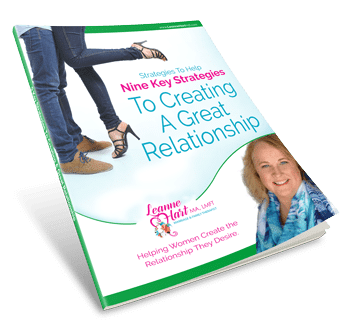Starting a new romantic relationship can be very exciting. Falling in love feels absolutely amazing and there is reason for it. Take a look at my blog article ‘Why Falling in Love Feels So Good’.
As wonderful as your new partner seems, however, there is no way to know what little things or potential red flags are lurking within. I tell all my clients, friends, and family members ‘there is no such thing as a relationship without risk”. Even long-term relationships of many many years can go south. I’ve even had a client who had been married for 70 years and wanted nothing more for the end of her life than to divorce her husband. Unfortunately, I don’t know if she ever got the chance to do so.
Just because all relationships have risk doesn’t mean you shouldn’t give it a shot. That first date can be nerve wrecking. If your past relationships have included abusive behavior of any kind you may be gun shy. However, if you want a new relationship you have to start somewhere.
Keep in mind that you can end a relationship anytime you want. Knowing you have the power of the word ‘no’ can help you take that first step into a new relationship. You are not trapped unless you allow yourself to be. There is less fear if you have the confidence to know you’ll get out when and if you need to.
However, don’t start a new significant relationship without considering common red flags and your own personal red flags. I have all my clients make a red flag list after each relationship has ended. In doing so, they become much better at letting go of someone quickly who exhibits traits they are not willing to tolerate. Eventually they are able to find the right person to spend their life with.
Let’s explore some common and some not so common red flags you should never ignore when considering a new committed relationship.
Your partner is controlling, jealous or doesn’t appear to trust you
Evaluating this can be tricky. It can sometimes feel like a compliment when your partner gets jealous. I’ve heard way too many women say ‘that shows he loves me’. Not so!!!
Controlling behaviors, jealousy and lack of trust typically means there is an issue and it’s a major red flag. These are all signs of an abusive relationship. You don’t have to be hit to be abused. As far as I am concerned, this is a deal breaker.
Here are a few examples.
- Your partner doesn’t like you to spend time with your friends or family.
- They get mad if you don’t answer their texts or phone calls immediately.
- He gets upset if other men talk to you or look at you.
- Going out with friends after work creates a problem.
- They accuse you of cheating when you’re clearly not.
You know very little about your partner’s personal life
Maybe you met online or at a bar. You feel you know your partner well. However, there is some important information about your partner’s life which they appear to be resistant to sharing with you.
I encourage my clients to get to know their potential love interest’s friends and family. You can get a better grip on who they are when they’re around people who love them.
Here are some typical alarms:
- You’ve never been to your partner’s home (He’s Married).
- Maybe, you are only allowed to call your partner at certain times (She’s Married).
- They haven’t let you meet any of their friends. (They have none which is a red flag itself).
- He / She hasn’t introduced you to any of their family or friends.
You disagree on core values and morals
Maybe you’re wanting to marry and have children eventually. It becomes a big deal when you want your child baptized and your other half is atheist. Explore one another’s values and morals prior to committing any further. It can make a difference. Here’s an exhaustive list of values to consider.
The basic must haves include but are not limited to:
- Honesty
- Loyalty
- Kindness
- Respect
- Openness
- etc….
There is verbal, psychological or physical abuse in the relationship
Keep in mind this very very important statement: “Love is a Behavior”. We all know someone who stays in an abusive relationship because ‘she loves me’. Love isn’t what someone says, It’s how someone treats you.
Abuse of any kind is not acceptable regardless of how someone feels about you. People have issues. Issues lead to bad behavior even with the best of intentions. Get Out!!!
A few examples include:
- He has pushed you when angry.
- She calls you names when she’s angry.
- Your partner admits to a history of violence with an ex.
- You are demeaned by your partner in front of your friends.
- They exhibit volatile moods.
There is a lack of communication between you
There must be intimacy In order to have a connected close relationship. Intimacy is established using words not sex. Intimacy is being able to share all your feelings with someone and having the faith they will respect them.
The inability to communicate is a big red flag. Most couples I see tell me that communication is their biggest problem. Some people just don’t know how. Everyone can learn. Don’t get too involved until the communication is open and honest.
Look out for these communication red flags:
- Your partner won’t tell you where they go when they go out with friends.
- Any communication about your relationship is avoided.
- When you want to discuss a sensitive subject your partner becomes moody and silent.
- The two of you cannot discuss the past.
- Your partner doesn’t call when they say they would.
- Your boyfriend will not let you look at any of his social media accounts.
Your partner appears to be cut off from important people in their life.
Although you are aware your partner has parents, siblings, children, and extended family in the area, they refuse to talk to them, about them, or see them.
Anyone can tell you ‘my family is crazy’ and maybe it’s true. If it is true you have to wonder if your partner has learned the same behavior or if they have learned better behavior by staying away. This is tough to know.
Everyone ever divorced will tell you their ex was crazy. It just can’t be true. If your partner isn’t even open to talking about it, I’d put it on the red flag list. If they can talk about it and you have witnessed some of it then you can reconsider.
Your partner is irresponsible, immature or unpredictable
Does your love interest appear not to take care of important aspects of their life as a normal adult would? Does he / she have behavior that reminds you of your wild college years? Little by little you are taking over some of their responsibilities?
Consider these as examples:
- They won’t pay a bill unless there is a consequence.
- You pay for everything without even a homemade meal in return.
- You’re told that your partner moved often and sometimes didn’t even have a place to live.
- They don’t take working seriously.
Your partner doesn’t want to commit to the relationship.
Although your partner is spending most of their free time with you, there are some hints that they are not as committed as you may have thought.
If your goal of a relationship is to eventually get married and have kids then tell them that upfront. I’ve told plenty of people to make that clear on the first date. Why waste your time?
If they say they do not want those things, then you have to leave. Don’t think you can change someone else’s life goals. You have to be with someone who wants the same things as you regardless of it working out in the long run
Maybe your partner won’t tell you verbally. Here are some telltale signs:
- You’re ready to take the relationship to the next level and your partner is not yet divorced.
- After 3 months of dating, you aren’t allowed to leave anything at your partner’s apartment.
You suspect there may be a substance abuse problem.
Many couples start their relationship by going out and having a drink or two which can be a great time. However, when the relationship continues and drinking appears to always be necessary to have a good time, you may want to consider whether there may be a drug or alcohol issue.
Watch out for the following:
- Your partner uses drugs on a regular basis.
- Your partner appears to have to have a drink wherever you go anytime of the day.
- One early drink leads to an entire day of drinking.
- Your significant other tries to hide their drinking or drug use from you.
You are Told What You Feel or Think
If your partner has even a little bit of narcissistic personality disorder they may tell you how you are feeling and what you are thinking.
Science has not yet achieved mind reading. Thus, only you know what you think or feel. If someone else is telling you then they aren’t respecting who you are and how you feel. This is a warning sign not to be ignored.
For example:
- “My boyfriend tells me I love how he hugs me. I actually hate it”
- “My wife tells me I believe everything the media tells me. I actually don’t”
- “My girlfriend accuses me of being mad at her when I am not. It’s like she starts a fight to prove it”
You Lack the Support You Want
Many people are takers and not givers. They have great expectations that their significant other will be there to support them in any situation from illness to imprisonment. Most healthy people in a relationships would include this type of support.
However, I’ve had many clients share with me how unsupportive their significant other is. It’s actually surprising. Support has to be two directional.
Use these true examples to understand. They are so shocking to me I remember after 25 years who each person was.
- “I was deathly ill lying on the hallway floor and he just stepped over me to get to the kitchen. He never asked if I needed anything”.
- “My car broke down on the freeway so I asked her to pick me up. She said she was in the middle of a movie and told me to call someone else”
- “When I was 4 months pregnant I began to bleed profusely. I called him at work and he said he couldn’t meet me at the hospital because he was in a meeting”
- “I needed to have private outpatient surgery. She wouldn’t get a babysitter to take care of the kids in order to take me or pick me up”
- “Earlier today I found a lump in my breast. My husband’s response was ‘well you have to die of something’.
The Relationship is on again, off again
Couples who break up and get back together deal with their issues by leaving, cooling off, missing each other, and getting back together. This is the prime example of a couple who cannot work through their issues (which all couples have) in a constructive manner.
It’s important to be able to talk through and work out differences without drama and chaos.
An on again, off again relationship can also be a sign that the couple is playing out the Cycle of Abuse. In a healthy relationship a couple will learn to fight fair and resolve conflict by discussing it. Ultimately they’ll feel closer than before.
Couples who learn to cope by leaving the relationship, or threatening to do so, cause chaos for themselves and family members. This is a very unhealthy pattern and it is a definite red flag.
Did the Relationship Begin With Some Significant Lies
I can’t even begin to tell you the discoveries my clients make well after they marry or make a long term commitment to their partner. Here are just a few:
- “My husband had 2 small children being raised by his mother 3 blocks over. I had no idea.”
- “My husband owed $54,000 in back child support for a child I didn’t know existed.”
- “My wife’s criminal record prevents her from leaving the state. I found this out embarrassingly when trying to vacation with another couple”.
- “That bachelor’s degree and master’s degree he had from Berkeley doesn’t exist”
If a relationship starts off with lies, don’t expect it to change. It’s hard to trust again and you may begin to second guess everything. This is no way to live.
The best time to find these things out is when you’re dating, not after you’re committed.
Your partner ignores their mental health issues
Mental health is very important. This is not to say that someone with a mental health issue can’t be a great partner. What really matters when it comes to mental health is that you or your partner take active steps on a continuous basis to take care of it.
If your new love interest tells you they’ve been diagnosed with bipolar disorder make sure they are, and will continue to be, medication compliant. Make sure they have a clinical psychologist and a psychiatrist they see regularly. Mental illness is not to be taken lightly. Professional help always needs to be part of their life taken seriously.
The red flags above focus on unhealthy patterns you can notice about your partner. There are many red flags that you can discover by evaluating things about yourself within the relationship. These also constitute red flags.
You feel suffocated
It’s normal in the beginning of a relationship to want to spend most of your time with your potential partner. It should be considered a potential red flag if that time begins to make you feel suffocated or caged.
I had a boyfriend at one point who was very kind and loving. However, as the relationship progressed he would want to spend every minute with me. I remember taking a shower one time and he was standing on the toilet eating yogurt talking to me. I could barely breathe. Needless to say the inability to be alone led me to ending the relationship eventually.
In addition, if you find yourself wanting some personal space and your partner isn’t comfortable with it, that could be a bad sign. Either they are very dependent, controlling or insecure. None of these are good signs.
You Feel You’re the One Who is Crazy
Toxic people have the ability to make their partners feel crazy. They use a form of manipulation to make their intimate partner question themselves. This tactic is called gaslighting. They need to protect their own insecurities and wrong doings so they have a way to turn situations completely around.
For instance:
Mary and Jack go out for dinner. Their server is a young good looking gentleman around their same age. Mary is appropriately friendly to him in the same way she would be with an 84 year old woman. When they arrive home, Jack begins to accuse her of flirting with the server. After he accuses her enough, Mary begins to question her own feelings and behaviors. Mary wonders if she did flirt with the server. She doesn’t think so but is so emotionally exhausted by Jack’s verbal abuse that she begins to doubt herself. She feels crazy and wonders if she’s losing her mind.
This in itself is a form of emotional abuse. Basically, the toxic partner will do anything to get their partner to doubt themselves. This is a huge red flag. Get out!
You Feel Like You’re Walking on Eggshells
It may take being with someone for a long time before you find yourself walking on eggshells. This is definitely not a healthy way to live. It means you are anxious or fearful of your partner’s behavior. You can tie this back to the red flag above regarding your partner being unpredictable.
Maybe you are constantly on edge wondering if some kind of abuse, embarrassment, or argument is going to happen at any given moment. You tend to tiptoe around your partner in hopes there won’t be an incident of any kind.
In a healthy long-term relationship you’ll look forward to your spouse getting home. You won’t fear it.
For example:
- “When I hear the garage door opening I run to the bedroom and pretend I was reading so I don’t have to deal with him”
- “I refuse to go out to dinner with her because she always ends up fighting with the server”.
- “I feel like I am walking on eggshells all the time I am with her”
Having to tiptoe around your partner is an obvious red flag.
Self doubt has grown
We all start relationships with a bit of low self-esteem in one area of our life or another. In a good relationship that bit of self doubt will go away. On the other hand, if that self doubt or self-esteem grows within the relationship you should consider you aren’t getting the support or respect you deserve.
You no longer feel like yourself
In all relationships we change little things about ourselves. However, if after a period of time you no longer feel like yourself or you no longer feel you can be yourself, you’ve changed too much. You may be accommodating your partner’s needs without even knowing it.
As a rule, you need to always be you. While you may grow and change for the good, if you no longer have a good sense of yourself it may not be a healthy relationship for you.
You no longer spend time with friends.
Your partner may not like you spending much time with friends and close family members. They may be controlling, possessive or jealous (see above )although they may never verbalize it out loud so it’s hard to identify.
You may ask yourself why you aren’t seeing friends and family much anymore. Think about it. Is there a price you’re paying for going out with friends or family that you hadn’t really noticed before?
Here’s a real example:
A female client shared that she had no friends and very little contact with family. As we explored more we discovered that when she went out with friends her husband would spend hours talking about how horrible they were. He’d say, for instance, ‘you know Justine is a whore and drinks too much, right?’.
My client would find herself defending her friends or family to the point that she just avoided going out at all. It was just easier, however, that’s no way to live. She was being manipulated covertly.
Conclusion
In conclusion, there are plenty of red flags to look out for before deciding to make a long term commitment to someone. Review the list above periodically throughout the relationship to make sure you’re not in a bad situation.
Also, when you think you are in love with someone you don’t tend to listen to those people who warn you against the relationship. Many times people cut off family members and long time friends for saying anything negative about the person they are about to marry. Keep in mind the following:
“If everyone who knows you and loves you the most is telling you the same thing, you may want to listen.”
Leanne
Think about it. What investment does your mother, sister, best friend, doctor etc. have in who you marry. They just love you and want to protect you. Perhaps they have nothing to gain by telling you the truth. At minimum consider what they say. They could literally save your life.



![Toxic Relationships [10 Signs You May Be in One]](https://askleanne.org/wp-content/uploads/2022/07/photodune-KvPZuyav-couple-fighting-in-the-morning-l-1-scaled.jpg)




